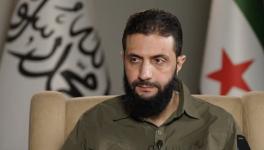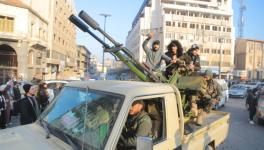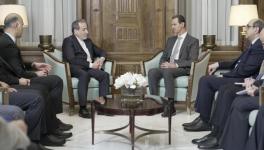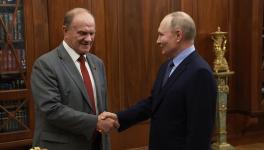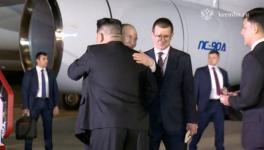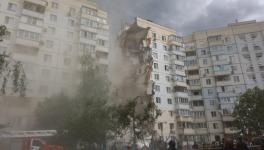Turkey Halts Offensive in Northeast Syria After Deal with Russia
Russia and Turkey signed an agreement on October 22.
Turkish forces have ceased operations in northeastern Syrian following an agreement between president Recep Tayyip Erdogan and Russian president Vladimir Putin on October 22, Tuesday. The deal was signed during Erdogan’s visit to Russia. According to the agreement, Turkey will not make any more attempts to capture territory in Syria. In return, all the “necessary measures to prevent infiltration of terrorist elements” into Turkey’s territories have been promised.
As per the deal, the People’s Protection Units (YPG) forces will move 30km away from the Turkish border within 150 hours. Russian and Turkish forces will jointly patrol the region between Ras al-Ain and Tal Abyad, along with an additional 10km area on both the eastern and western sides, excluding the city of Qamishli.
The deal will apply to a 125 km-long stretch of the Syrian-Turkish border between Ras al-Ain and Tal Abyad. Though this falls short of the original Turkish demand of a 444 km long and 32 km wide “safe zone” – which would cover the entire stretch from Afrin in the west to the Iraqi border in the east – it effectively avoids any chances of direct confrontation between the Turkish and Syrian forces. The rest of the border region will be controlled by the Syrian and the Russian forces. The YPG militias and their armaments will also move out of Manbij and Tal Rifat.
The agreement also talks about joint efforts to “facilitate the return of the [Syrian] refugees in a safe and voluntary manner,” and following the process initiated by the Astana agreement, to avoid all kinds of armed confrontation among the parties.
The Astana Process began in early 2017 when Russia, Turkey and Iran met and decided to create a de-escalation zone in the rebel-held areas in Syria to end the war in the country. So far, Turkey has not implemented its part of the bargain of convincing the rebels in Idlib to surrender and withdraw.
The Russia-Turkey deal also talks about the implementation of the Adana agreement which was signed by the then Turkish president Suleyman Demirel and the then Syrian president Hafez al-Assad in 1998. According to the agreement, Syria was to end its support to the Kurdistan Workers Party (PKK) and its affiliates in the country. Though Syria had expelled Abdullah Ocalan, the leader of the PKK and handed him over to Turkey, it has not taken any action against the YPG. Turkey alleges that the YPG is an affiliate of the PKK, which is waging a struggle of self-determination in Turkey.
The YPG is a major constituent of the Syrian Democratic Forces (SDF), which fought against the Islamic State (IS) forces in alliance with the US. After the US withdrew, it signed an agreement with the Bashar al-Assad government to stop the Turkish invasion.
At first glance, the Russia-Turkey deal looks similar to the US-Turkey deal which was signed on October 17. However, unlike the US, which has withdrawn its remaining forces from Syria and therefore is in no position to guarantee a “safe zone,” Russia, with its troops on the ground and a strong relationship with the Syrian government, can do so. Russia is also in a situation to enforce terms on the Turks and the Astana process has been one of the more successful series of talks to resolve the situation in Syria.
Al-Assad visits border areas
Meanwhile, Syrian president Bashar al-Assad visited areas which were recently captured by the Syrian forces from the Turkish-backed rebels in Idlib, on October 22. According to a report by SANA, Assad accused the Turkish president of stealing Syrian land and resources, along with helping terrorists against the Syrian state. However, as per the deal with Russia, Turkey has vowed to respect the territorial integrity of Syria.
The failure of Turkey to implement the Astana process in Idlib led the Syrians and the Russians to start a joint air and ground offensive in March. Though that offensive was finally halted in August after the Syrian forces captured the crucial town of Khan Shaykhun and an important highway linking Damascus and Aleppo, Assad has often spoken of reintegrating the remaining territories.
After more than eight years of war in the country, the Syrian government has been able to take back control of more than 60% of its territories from rebel hands. Around 400,000 people have been killed in the war in Syria since 2011. Almost half of the country’s total population of 20 million has been displaced and live as refugees. The Turkish invasion of north-east Syria has aggravated the humanitarian crisis. It has already caused the displacement of around 200,000 to 300,000 people and the deaths of scores of others.
Get the latest reports & analysis with people's perspective on Protests, movements & deep analytical videos, discussions of the current affairs in your Telegram app. Subscribe to NewsClick's Telegram channel & get Real-Time updates on stories, as they get published on our website.












